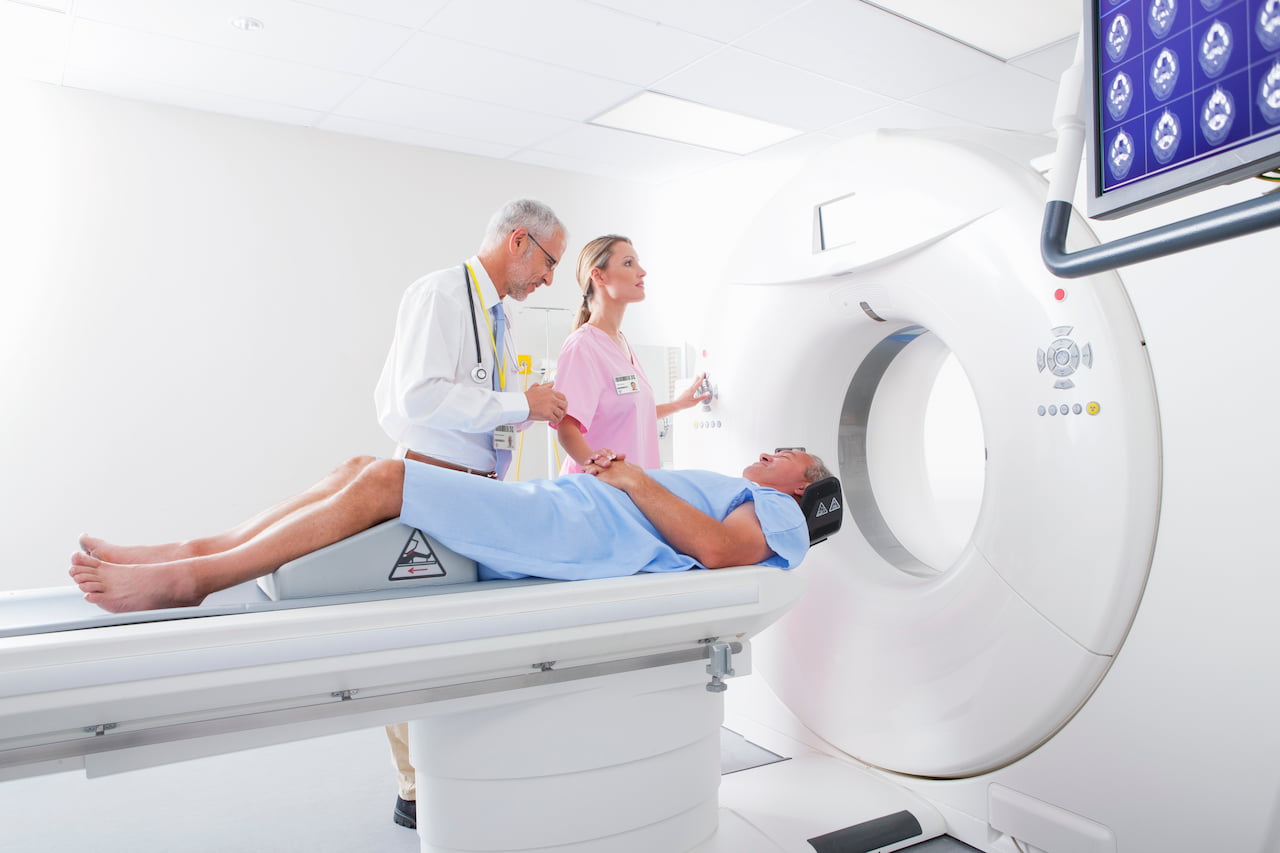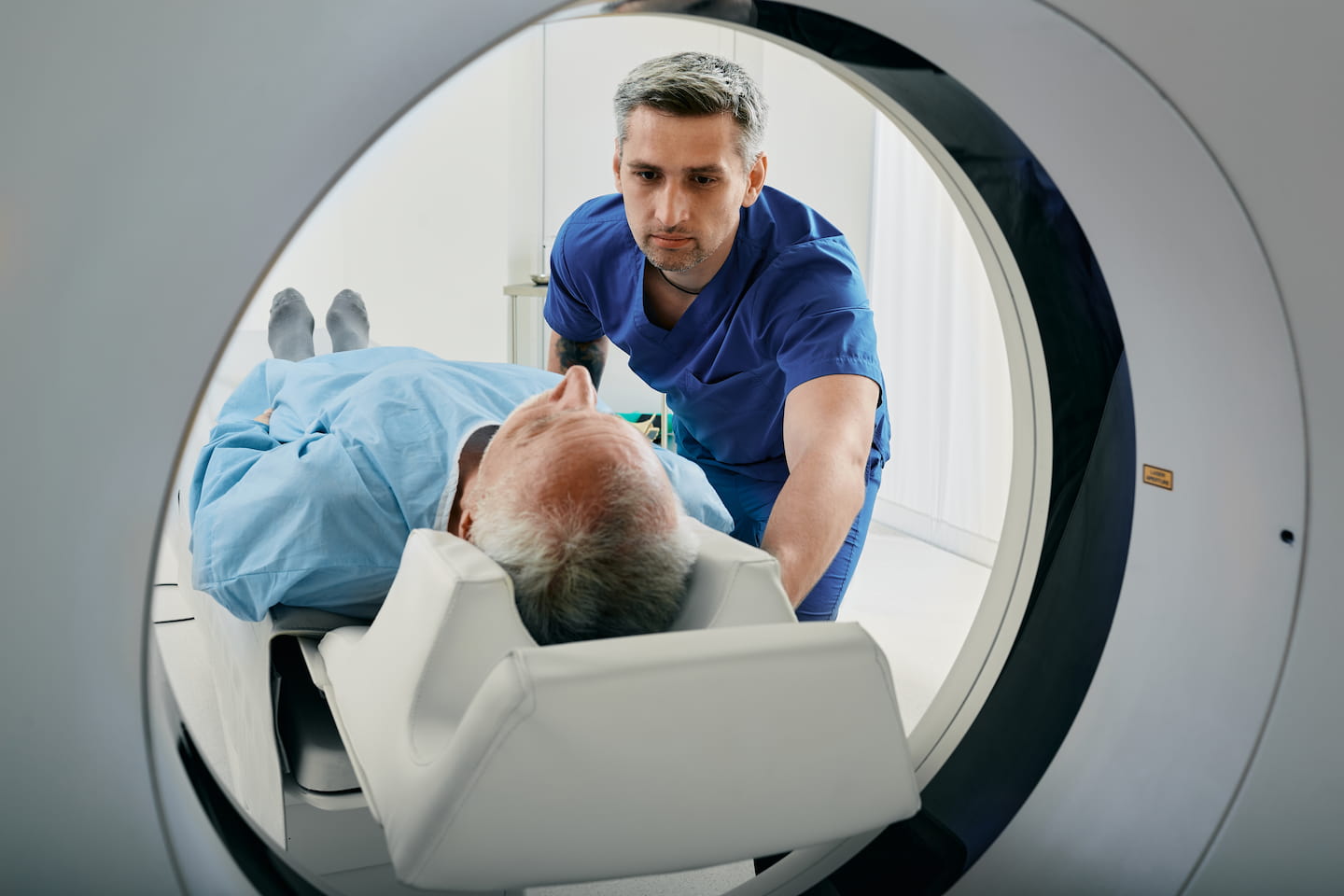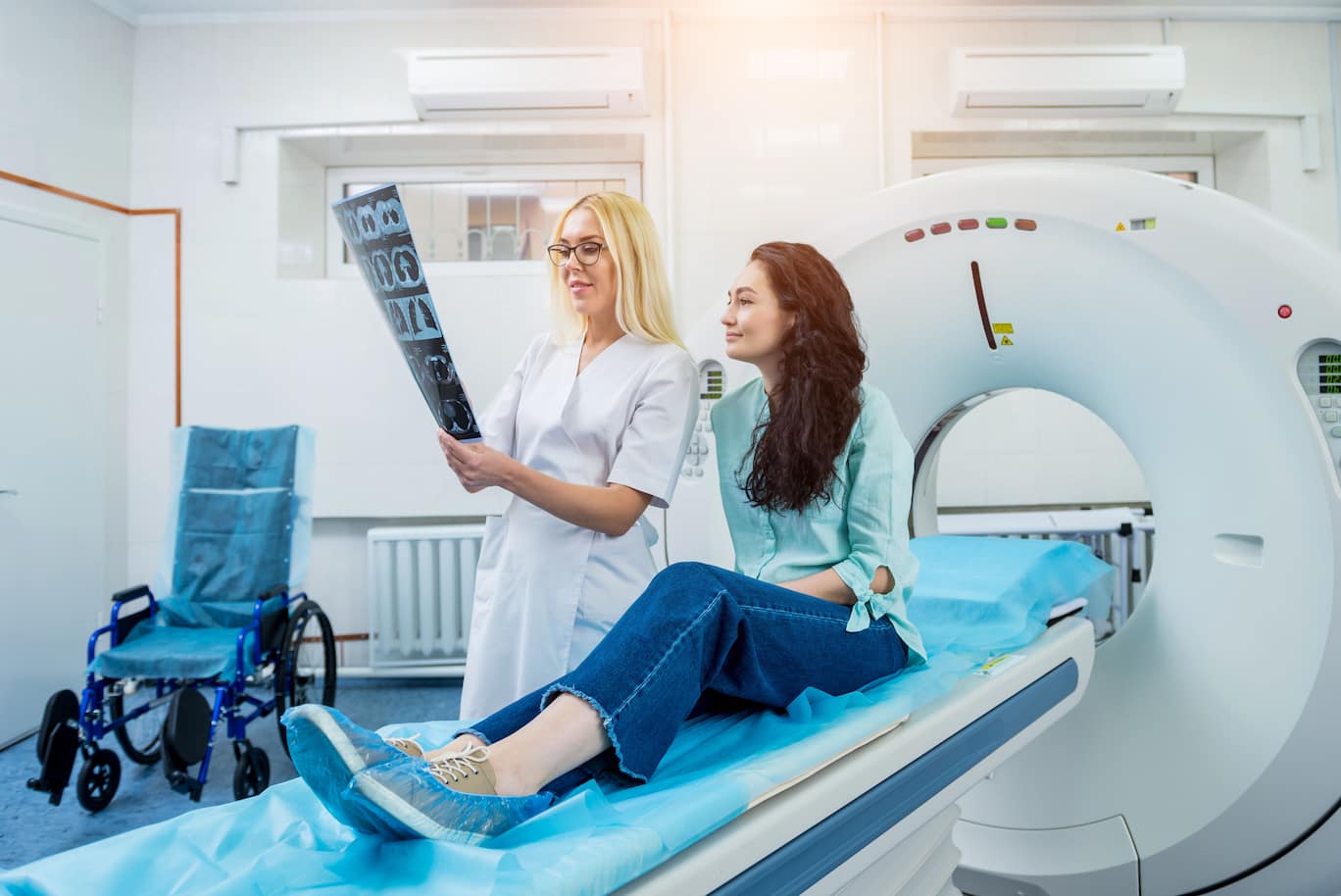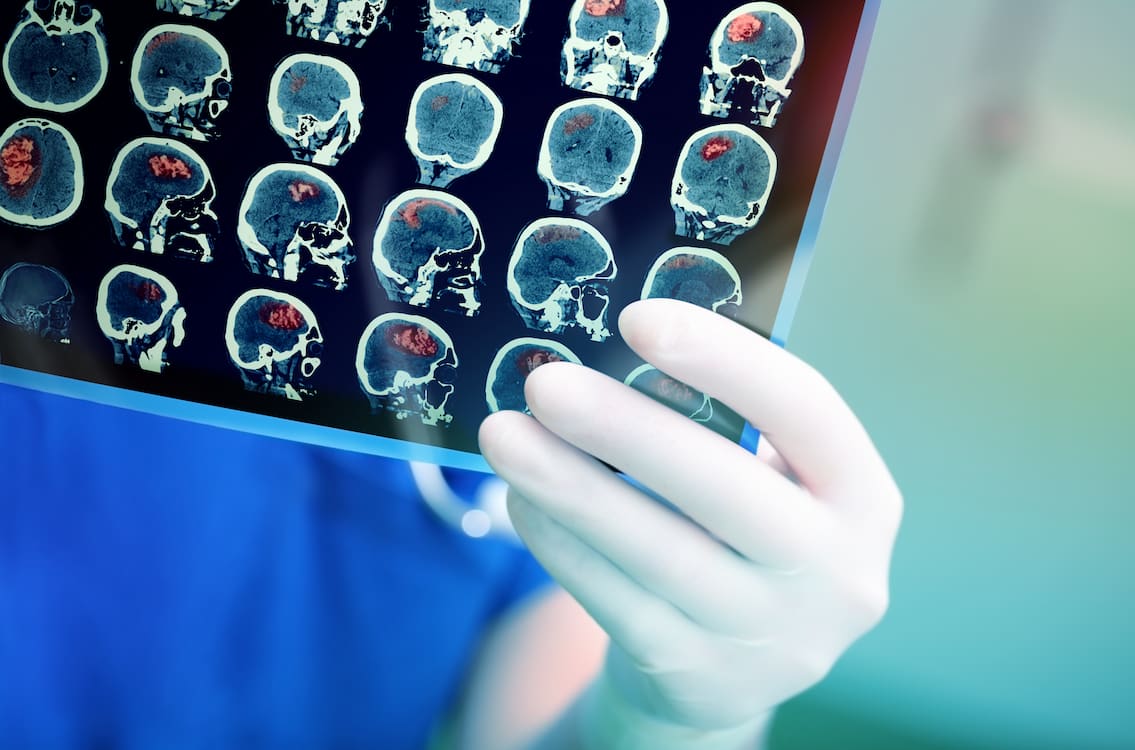CT Scan in Turkey
Healthy Türkiye helps you find the best ct scan in Turkey at affordable prices and adopts a 360-degree service approach in all areas of health through affiliated hospitals.
- Homepage
- Medical Treatment
- CT Scan in Turkey

About CT Scan in Turkey
Computed tomography (CT) is a medical imaging technique that uses tomography. A three-dimensional representation of the inside of an object is generated using digital geometry processing from a vast number of two-dimensional X-ray images taken around a single axis of rotation. The term “tomography” is derived from the Greek words tomos (slice) and graphein (graph) (to write).
Because it was created at an EMI research unit, computed tomography was originally known as the “EMI scan.” EMI is primarily known today for its music and recording business. It was renamed computerized axial tomography (CAT or CT scan) and body section roentgenography later on.
CT scan in Turkey generates a volume of data that can be altered using a technique known as “windowing” to show various structures based on their capacity to obstruct the X-ray/Röntgen beam. Although pictures were traditionally created in the axial or transverse plane (orthogonal to the body’s long axis), newer scanners allow this volume of data to be reformatted in multiple planes or even as volumetric (3D) depictions of structures.
Although most commonly employed in medicine, CT is also used in nondestructive materials testing. Another example is the use of a CT scanner to investigate biological and paleontological materials.
A CT scan can be performed in the Radiology Department’s outpatient facility. It takes about 20 to 30 minutes to perform the treatment. As a result, the patient is not admitted to the hospital and can return home as soon as the surgery is completed. If contrast is administered to the patient during the process, the patient may become queasy and be instructed to sit or lie down for a period of time. In the case of a youngster, a sedative may be administered to keep the child still and peaceful, which may have an effect even after the surgery. In such a case, the child is restrained until he is able to walk.
If you are looking for a computerized tomography (CT) scan in Turkey, please contact Healthy Türkiye for a free consultation with the top specialist cardiologists. You will be given a full analysis and recommendations for the computerized tomography (CT) scan that you are looking for.

CT Scan Procedure in Turkey
CT Scan is a computed tomography Scan that doctors use to examine the patient’s normal and abnormal body regions. It consists of a series of X-rays that provide detailed and sliced (Cross-sectional) images of the body’s organs, bones, and tissues. These X-ray images may be seen on the monitor, and the images acquired are known as tomograms. A CT scan produces more detailed images than an X-ray exam.
CT scans in Turkey are sometimes performed with a dye or contrast that is delivered to the patient, which aids in properly outlining the bodily organs for a complete examination of the patient’s situation. CT scans are non-invasive and aid in the creation of a highly detailed image.
Healthy Türkiye offers state-of-the-art treatment facilities designed to deliver healthcare at an affordable cost. The technology and equipment commissioned at hospitals affiliated with Healthy Türkiye are comparable to the best available in the most advanced centers in the world. It offers the widest range of technologies to deliver personalized patient care and high-quality healthcare.

We Care About Your Health
Healthy Türkiye provides the best for your health and comfort. You will feel privileged with us.
7/24 Quality Personal Assistance Throughout Your Journey
Customizable for You All-Inclusive Packages
Get the Right Advice for your Health
CT Scan Turkey
CT scan stands for “computerized tomography,” and CAT scan is for “computerized axial tomography.” It is a radiology diagnostic study that employs X-rays and a computer to create cross-sectional images of the body. A CT scan in Turkey is a quick and painless process that produces more detailed images than an X-Ray. It can identify a variety of disorders affecting many sections of the body, including bones, organs, blood vessels, and soft tissues. The CT Scan is a day-care procedure that does not require hospitalization. Once the scan is finished, the patient will be able to return home.
Prior to the scan, the patient will be instructed to fast from food and drink only liquids for a set length of time. On the day of the scan, the patient will be given a hospital gown to wear and will be requested to remove all jewelry and metal fastenings. The CT scan procedure will next begin, which will involve the following steps:
Initially, the patient will be asked to lie face up on the motorized table that glides into the CT machine. If necessary, the patient may be advised to alter positions, such as facing downwards or sideways. An intercom allows the radiologist to interact with the patient and provide directions, if necessary. During the scan, the patient must remain completely motionless because any movement will cause the image to blur.
The scan is completed when the desired number of image slices is obtained, as instructed by the doctor. A CT scanner is a big, tunnel-like structure with a table that goes through it slowly. To begin the scan, the individual will be instructed to lie down on the table. A scanner inside the CT machine rotates around the body and takes a series of X-rays from various angles as the table progressively slides into the machine. When the scanner completes one spin, one entire slice is completed, and the image is saved on the computer.
The X-ray scanner’s rotation is then repeated to generate another image slice. As a result, the process is repeated until the desired number of picture slices, up to 256 slices, is obtained. These collected image slices can be displayed individually or stacked together by the computer that stores the images during the scan to generate a 3-D image of the patient. The individual image slices or the 3-D image of the body makes the doctor’s job easier to spot the exact location of the issue.

How Is CT Scan Performed in Turkey?
A computed tomography (CT) scan is a medical imaging method that employs computer-processed tomography. A CT scan can produce very detailed images of the brain, spine, chest, and abdomen. During biopsies, a CT scan can be utilized to guide a surgeon to the correct location being checked.
It is also used to identify tumors and malignancies and to diagnose illnesses.
A CT scan may also be utilized to aid in the research of blood vessels.
A radiology technologist performs a CT scan. The patient must lie down on a tiny table that fits into the center of the CT scanner. The patient must lie on the back, side, or stomach, depending on the portion of the body being scanned. X-ray beams circle the patient while he or she is in the CT scanner. Small detectors within the scanner count the number of x-rays required to scan the body part. A computer uses the information from the scanner to create individual images known as “slices.” These photographs are displayed on a computer monitor and can be saved and printed. Three-dimensional pictures of organs are created by connecting the slices.
The patient must remain still throughout a CT scan in order for clear images to be generated. If the patient moves throughout the process, the images may become blurry. In addition, the patient may be compelled to hold his or her breath for short periods of time.
A CT scan in Turkey is a very safe process. Some uncommon dangers include – Reaction to contrasts, which can induce nausea, vomiting, sneezing, and itching. The chances of this happening are one in 100,000. – Leakage of contrast outside the vein if contrast is administered intravenously.

Types of CT Scan in Turkey
A CT (computerized tomography) scan is a diagnostic technique that uses X-rays to detect any abnormalities within the human body. This exam is more advanced than a standard X-ray. While a normal X-ray image clearly shows only bones, a CT scan aids in the visualization of soft tissues, blood vessels, and solid organs such as the lungs, liver, and brain. A CT scan produces cross-sectional images of the body’s interior organs. Depending on the organs that are to be studied, a CT scan in Turkey can be of the following types:
CT Scan Brain: In this technique, the brain and all of its components are thoroughly examined. To analyze the tissue thoroughly, X-rays are focused on the brain. During this operation, the brain, medulla, cerebellum, cranial blood vessels, and skull bones can be investigated in great detail. Some of the criteria for a CT scan of the brain include cerebral aneurysm, cerebral hemorrhage, brain malignancy, cavernous sinus thrombosis, and hydrocephalus. The procedure is also referred to as a CT scan head/CT scan skull.
CT Scan Neck: The neck contains many vital structures such as the spinal cord, thyroid gland, esophagus, and larynx. If any of these structures need to be evaluated for abnormal changes, a CT scan of the neck can be performed. A CT scan of the neck can detect diseases such as esophageal varices, tracheal stenosis, and thyroid nodules.
CT Scan Chest: The lungs and heart are housed in the chest cavity, which is the most essential organ in the human body. A CT scan of the chest allows for a more detailed examination of these organs. This treatment can be used to diagnose illnesses such as pulmonary embolism, pulmonary edema, lung cancer, mediastinal carcinoma, and cardiomegaly. In women, a CT scan may be useful in identifying breast problems.
CT Scan of the Spine: The spinal cord is a vital organ that connects the brain to the rest of the body. The spinal column encloses and protects it. A CT scan of the spine aids in the investigation of any abnormal alterations in the vertebral column or spine. Some of the health issues that can be diagnosed using a CT scan in Turkey, spine are intervertebral disc herniation, spinal tumors, and intervertebral cartilage deterioration.
CT Scan Abdomen: The abdominal cavity contains practically all of the organs that comprise the digestive system. A CT of the abdomen aids in the visualization and diagnosis of illnesses affecting numerous abdominal organs, such as the liver, intestines, pancreas, and spleen. It can also aid in the diagnosis of a disorder known as peritonitis.
CT Scan Pelvis: The pelvic cavity is located beneath the abdominal cavity. The reproductive organs of both men and women are positioned in the pelvic cavity. Pelvic CT scans to aid in the visualization of reproductive and other pelvic organs. This inquiry aids in the diagnosis of uterine, vaginal, cervix, and ovarian problems in women. Men experiencing prostate problems are encouraged to have a pelvic CT scan. A pelvic scan can also reveal urinary problems such as cystitis, bladder cancer, and urethritis.
CT Scan Limbs: CT scans of the arms and legs are performed on individuals who have had limb trauma. A CT scan can detect swelling, infection, and pain of unclear origin in the arms or legs.
CT Angiography: This is a CT scan-based examination of arteries and veins. It is beneficial in situations such as deep vein thrombosis, pulmonary embolism, aneurysms, varicose veins, and so on.
CT scan of the entire body: When patients present with many systemic illnesses, a CT scan might be performed. This inquiry produces excellent results when a variety of organs or systems in the body need to be studied.
CT Scan with contrast: A dye injection is sometimes required before a CT scan. A contrast liquid dye is injected into the individual’s veins, where it circulates via the bloodstream to all body areas. It improves clarity during CT scans and can be used to study minute changes in bodily tissue or very small tissues.
CT Scan without contrast: Contrast dye is not always required for CT scanning. The doctor may sometimes proceed with the scan without using a dye. Contrast is required for CT angiography because pictures cannot be seen well without it.
CT scan in Turkey is a sophisticated diagnostic tool that employs radiation beams. Patients are urged not to undergo the scan without the guidance and prescription of a doctor. For successful surgery and accurate results, patients should carefully follow all procedure instructions.
What Is the Difference Between a CT and PET Scan?
The primary distinction between a CT scan and a PET scan is their emphasis. A CT scan produces a detailed, still image of organs, bones, and tissues. A PET scan, on the other hand, tells specialists how your body’s tissues function at the cellular level. Other distinctions include: They employ several materials: CT scans create images by passing x-rays through the body. A PET scan employs a radioactive substance that emits energy. A unique camera detects the energy and produces photos.
A PET scan takes longer to complete: A CT scan, which takes only a few minutes. This makes it a fantastic tool for use in emergency situations where doctors must respond quickly. Depending on the patient’s health, a PET scan could take anywhere from 20 minutes to several hours. In some situations, the procedure may take many days to complete.
Radiation from a CT scan does not remain in the body: There is no radiation left in the body after a CT scan. On the contrary, a small quantity of radiation may remain in the body for a brief period of time following a PET scan.
PET scans reveal cancer before other tests: Unlike other types of imaging in Turkey, a PET scan detects molecular activity and assists doctors in identifying diseases in their early stages. As a result, a PET scan is a highly reliable method for cancer detection. CT scans detect problems once a disease begins to alter the structure of tissues or organs.
You may be nervous about the operation, whether your doctor has ordered a CT scan or a PET scan. Any medical imaging check might generate anxiety both before and after the procedure. The staff of committed, empathetic technologists at the best hospitals in Turkey strives to make the experience as enjoyable and stress-free as possible. It is offered cutting-edge equipment and caring specialists, so you can count on Healthy Türkiye to meet your imaging needs. Contact Healthy Türkiye now to learn more about our services or to make an appointment.
How Are PET and CT Scans Similar?
CT and PET scans focus on distinct areas of the human body and employ different materials to accomplish this, yet they have many similarities. The following are similarities between CT and PET scans: both are typically performed at an outpatient facility and do not require a hospital stay. They are both are capable of detecting malignancy, two treatments are precise, painless, and noninvasive. Also they contribute to the elimination of the necessity for exploratory surgery.
Most importantly, both types of imaging tests assist doctors in determining the underlying reason for a patient’s symptoms. This enables doctors to treat their patients successfully and assist them in living healthy lives.
2026 Cost of CT Scan in Turkey
All types of medical attention like CT scans, are very affordable in Turkey. Many factors are also included in determining the cost of CT scans in Turkey. Your process with Healthy Türkiye will last from the time you decide to have a CT scan in Turkey until the time you are fully recovered, even if you are back home. The exact cost of a CT scan procedure in Turkey depends on the type of operation involved.
The cost of a CT scan in Turkey does not demonstrate many variations in 2026. Compared to costs in developed countries like the United States or the UK, CT scan costs in Turkey are relatively low. So, it’s no wonder patients from across the world visit Turkey for CT scan procedures. However, price is not the only factor affecting choices. We suggest looking for hospitals that are safe and have good CT scan reviews on Google. When people decide to seek medical help for a CT scan, they will not only have low-cost procedures in Turkey, but also the safest and best treatment.
At clinics or hospitals contracted with Healthy Türkiye, patients will receive the best CT scan from specialist doctors in Turkey at affordable rates. Healthy Türkiye teams provide medical attention, CT scan procedures, and high-quality treatment to patients at a minimum cost. When you contact Healthy Türkiye assistants, you can get free information about the cost of a CT scan in Turkey and what this cost covers.
The price of a CT scan ranges from £1.500 to £2.600 per scan in the UK.
The price of a CT scan ranges from $3.000 to $3.200 per scan in the USA.
The price of a CT scan ranges from $850 to $1.000 per scan in Turkey.
Price of CT Scan in the UK
Price of CT Scan in the USA
Price of CT Scan in Turkey
Why Is CT Scan Cheaper in Turkey?
One of the main considerations before traveling abroad for a CT scan is the cost-effectiveness of the whole process. Many patients think that when they add flight tickets and hotel expenses to their CT scan costs, it will become very expensive to travel, which is not true. Contrary to popular belief, round-trip flight tickets to Turkey for a CT scan can be booked very affordably. In this case, assuming you are staying in Turkey for your CT Scan, your total travel expense of flight tickets and accommodation will only cost less than any other developed country, which is nothing compared to the amount that you are saving.
The question “why CT Scan cheaper in Turkey?” is so common among patients or people simply curious about getting their medical treatment in Turkey. When it comes to CT scan prices in Turkey, there are 3 factors that allow for cheaper prices:
The currency exchange is favorable for whoever looking for CT Scan has a euro, dollar, or pound.
The lower cost of living and cheaper overall medical expenses such as CT scans.
For CT scans, incentives are given by the Turkish Government to medical clinics working with international clients.
All these factors allow for cheaper CT scan prices, but let’s be clear, these prices are cheaper for people with strong currencies (as we said, the euro, dollar, Canadian dollar, pound, etc).
Every year, thousands of patients from all over the world come to Turkey to get a CT scan. The success of the healthcare system has increased in recent years, especially for CT scans. It’s easy to find well-educated and English-speaking medical professionals in Turkey for all kinds of medical attention, such as a CT scan.
Why Choose Turkey for CT Scan?
Turkey is a common choice among international patients seeking an advanced CT scan. Turkey’s health procedures are safe and effective operations with a high success rate like CT Scan. The increasing demand for high-quality CT scans at affordable prices has made Turkey a popular medical travel destination. In Turkey, CT scanning is performed by highly experienced and trained doctors with the most advanced technology in the world. CT scanning is done in Istanbul, Ankara, Antalya, and other major cities. The reasons for choosing CT scan in Turkey are as follows:
High-quality hospitals: Joint Commission International (JCI) accredited hospitals have dedicated CT scan units that are specially designed for patients. International and national strict protocols provide effective and successful CT scan for patients in Turkey.
Qualified experts: The expert teams include nurses and specialist doctors, together to carry out CT scan according to the patient’s needs. All the included doctors are highly experienced in performing CT scan.
Affordable price: The cost of CT scans in Turkey is affordable compared to Europe, the USA, the UK, Singapore, Australia, etc.
The high success rate: Highly experienced specialists, the best available technology, and stringently followed safety guidelines for post-operative care of the patient, result in a high success rate for CT scan in Turkey.
Is CT Scan Safe in Turkey?
Did you know Turkey is one of the most visited destinations for CT scan in the world? It is ranked as one of the most popular tourist destinations for CT scan. Over the years it has also come to be a very popular medical tourism destination, with many tourists coming in for CT scan. There are so many reasons why Turkey stands out as a leading destination for CT scan. Because Turkey is both safe and easy to travel to, with a regional airport hub and flight connections to pretty much everywhere, it is preferred for CT scan.
The best hospitals in Turkey have experienced medical staff and specialists who have performed thousands of medical services such as CT scan. All procedures and coordination related to CT scan are controlled by the Ministry of Health in aCT scanordance with the law. Over many years, the greatest progress in medicine has been observed in the field of CT scan. Turkey is known among foreign patients for its great opportunities in the area of CT scan.
To emphasize, besides the price itself, the key factor in selecting a destination for CT scan is certainly the standard of medical services, the hospital staff’s high expertise, hospitality, and the safety of the country.
All-Inclusive Packages for CT Scan in Turkey
Healthy Türkiye offers all-inclusive packages for CT Scan in Turkey at much lower prices. Extremely professional and experienced doctors and technicians carry out high-quality CT scans. The cost of CT scan in European countries can be quite expensive, especially in the UK. Healthy Türkiye provides cheap all-inclusive packages for long and short stay of CT scan in Turkey. Because of many factors, we can provide you with many opportunities for your CT Scan in Turkey.
The price of CT scans differs in other countries due to medical fees, staff labor prices, exchange rates, and market competition. You can save much more in Turkey with a CT scan compared to other countries. When you purchase CT scan’s all-inclusive package with Healthy Türkiye our healthcare team will present hotels for you to choose from. In CT Scan travel, you will have the price of your stay included in the all-inclusive package cost.
In Turkey, when you purchase CT Scan all-inclusive packages through Healthy Türkiye, you will always receive VIP transfers. These are provided by Healthy Türkiye, which has contracted with highly qualified hospitals for CT scans in Turkey. Healthy Türkiye teams will organize everything about your CT scan for you and have you picked up from the airport and safely brought to your accommodation. Once settled in the hotel, you will be transferred to and from the clinic or hospital for the CT scan. After your CT Scan has been successfully completed, the transfer team will return you to the airport in time for your flight home. In Turkey, all packages of CT scanning can be arranged upon request, which relaxes the minds of our patients.
The Best Hospitals in Turkey for Ct Scan
The best hospitals in Turkey for ct scan are Healthy Türkiye, Memorial Hospital, Acıbadem International Hospital, and Medicalpark Hospital. These hospitals attract patients from all over the world seeking ct scan due to their affordable prices and high success rates.
Best Doctors and Surgeons in Turkey for Ct Scan
The best doctors and surgeons in Turkey for ct scan are highly skilled professionals who offer specialized care and advanced procedures. With their expertise and state-of-the-art techniques, these specialists ensure that patients receive high-quality ct scan and achieve optimal health results.

Frequently Asked Questions
It is critical to obtain a recommendation or prescription from a doctor before receiving a CT-Scan so that the CT scanning can be tailored to the physician's specifications. Before recommending a CT-Scan, the doctor must carefully evaluate the patient and check for all information. It is also critical to inform the doctor about any pregnancy or allergic reactions before to the scan.
The CT- Scan employs radiation, which should not be used in excess. As a result, no one should accompany you into the CT scan room.
A CT scan appointment typically lasts about 15 minutes. A CT scan with oral contrast could take up to one hour and fifteen minutes. If you are receiving IV contrast for a CT scan, do not eat or drink for 4 hours before your exam.
Typically, your scan findings will not be available right away. The information from your scan will be processed by a computer before being analyzed by a radiologist (a specialist in interpreting images of the body).
Metal objects, such as jewelry, eyeglasses, dentures, and hairpins, may interfere with CT pictures and should be left at home or removed before your appointment. Hearing aids and removable dental procedures may also be requested. Women will be required to remove metal underwire bras.
There is no radiation left in your body after a radiographic, fluoroscopic, CT, ultrasound, or MRI exam. A small quantity of radiation can remain in the body for a short period of time during nuclear medicine imaging.
The CT scan procedure is painless and does not affect the ability to drive for any person. Therefore, it is not necessary to bring an escort for the scan.
